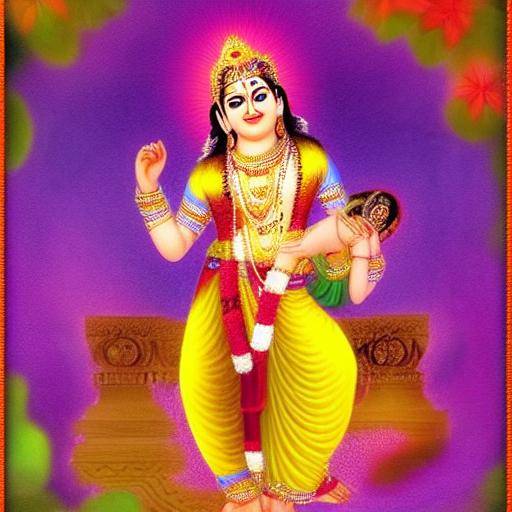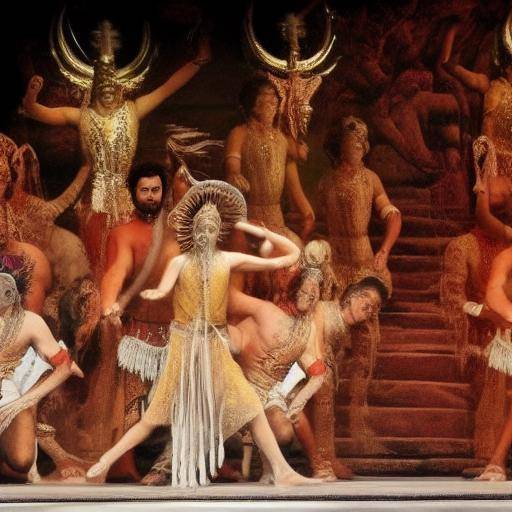
Introduction
Hindu culture gives us a rich and complex pantheon of deities that reflect various aspects of human existence. Among these divine figures, Krishna stands out as the lord of joy, love and compassion. In this article, we will explore Krishna's figure, its importance in Hindu myths and how the god of love is considered. We will discover the fascinating history, meaning and applications of love in Hindu mythology, and explore Krishna's influence in the modern world.
The History and Legacy of Krishna
Krishna, whose name means "the dark" or "the attractive", is one of the most beloved and revered figures in Hindu mythology. His history is intertwined with mystical adventures, divine acts and timeless teachings that have deeply impacted the culture and spirituality of India. He is considered an incarnation of the god Vishnu, who descends to the earth to restore balance and harmony.
Krishna's main story is found in the Mahabharata, one of the oldest epic texts in India, where his role as an advisor, friend and essential guide to the Pandava family has left an indelible mark on Indian tradition.
Historical Details and Deep Meanings
The figure of Krishna has evolved over the millennia, adapting to the changing spiritual and cultural needs of society. Its influence extends from ancient mythology to literature, art and contemporary music.
Love in the Hindu Myths
Hindu myths are impregnated with expressions of love in their various forms: divine love, filial love, brotherly love and romantic love. Krishna personifies love in all its dimensions, from the devotional love of his followers to his captivating relationship with Radha, a symbol of unconditional love and dedication.
The God of Love
Krishna not only represents love, but also is the master of love, imparting the precious lessons of disinterested love, compassion and wisdom that transcend time and space. His transcendental love is an inspiration for people of all ages and origins, providing comfort and hope in a world marked by distrust and dislike.
Deep analysis
Benefits and Challenges of Infinite Love
Unconditional love promoted by Krishna can bring profound benefits, such as inner peace, interpersonal harmony and a greater understanding of universal connection. However, it can also pose challenges in challenging established social, cultural and religious norms.
Current Perspectives and Opinion
Love has such a universal meaning that it has been studied and reflected by philosophers, theologians, psychologists and poets. The diverse perspectives on love, influenced by the Krishna figure, open a fascinating field of interdisciplinary analysis.
Comparative analysis
Compare Krishna's vision of love with other belief and mythological systems can offer a valuable understanding of the diversity of expressions of love and its impact on human societies throughout history.
Tips and Suggested Actions
Krishna's teaching on unconditional love can be translated into practical advice for daily life, helping people cultivate more positive relationships, practice compassion and find lasting happiness.
Conclusions and FAQs
Conclusion
The figure of Krishna as the god of love and joy continues to inspire and captivate millions of people around the world. His message of universal love and compassion endures as a beacon of hope in our modern world, offering a timeless vision of the true nature of love.
Frequently asked questions
1. Who is Krishna in Hindu mythology?
Krishna is a central figure in Hindu mythology, considered an incarnation of the Vishnu god. His story is found in the Mahabharata and the Bhagavad Gita, where he plays diverse roles, from friend and counselor to lover and spiritual leader.
2. What is the meaning of love in Hindu myths?
Love in Hindu myths encompasses a variety of expressions, from devotional love to gods to human relationships based on affection, dedication and devotion. Krishna personifies this love in all its forms, projecting a message of universal love and compassion.
3. How does Krishna relate to the god of love?
Krishna is known as the god of love because of his teachings and relationships, in particular his connection with Radha, which symbolizes a profound and transcendental love. His role as master of love transcends the romantic, encompassing unconditional love and compassion.
4. What is Krishna's timeless message about love?
Krishna's message about love is the practice of unconditional love and compassion, which transcends the barriers of ego, possession and personal interests. It proposes a vision of universal love that reaffirms the spiritual connection between all beings.
5. How can Krishna myth apply to everyday life?
Krishna's teachings on love can apply to daily life by cultivating more positive relationships, practising compassion and extending disinterested acts of goodness to others, which contributes to a more full and happy life.
6. What is Krishna's legacy in contemporary culture?
Krishna's influence is manifested in music, art, literature and contemporary spirituality, inspiring people from diverse traditions to cultivate love, joy and compassion in their lives.
With this, it is clear that Krishna is much more than a mythical figure; he is a living symbol of love and compassion that transcends time and culture, offering an eternal message of union, happiness and peace. His legacy continues to inspire and transform lives around the world, reminding us of the omnipresence of love in human existence.




